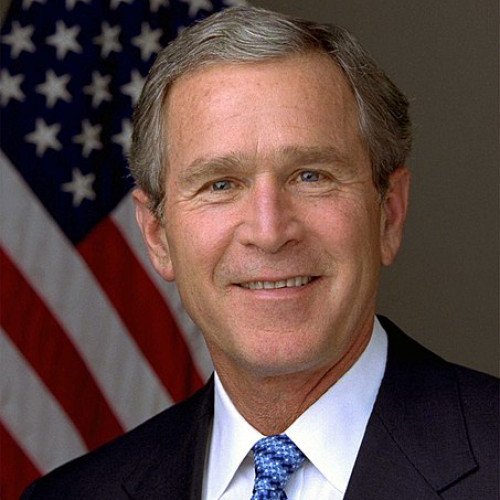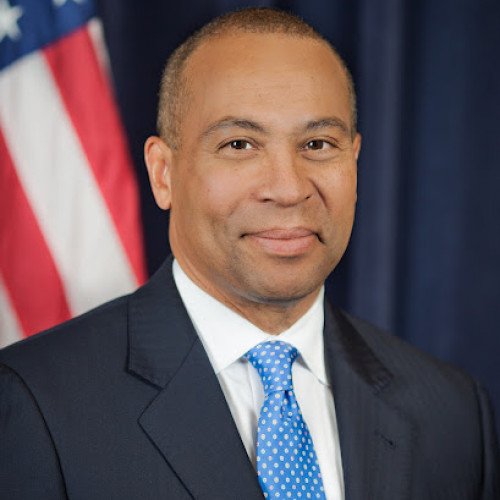George W. Bush VS Deval Patrick

George W. Bush
George Walker Bush (born July 6, 1946) is an American politician and businessman who served as the 43rd president of the United States from 2001 to 2009. A member of the Republican Party, he had previously served as the 46th governor of Texas from 1995 to 2000. Born into the Bush family, his father, George H. W. Bush, served as the 41st president of the United States from 1989 to 1993. Bush is the eldest son of Barbara and George H. W. Bush. As such he is the second son of a former United States president to himself become the American president, with the first being John Quincy Adams, the son of John Adams. He flew warplanes in the Texas and Alabama Air National Guard. After graduating from Yale College in 1968 and Harvard Business School in 1975, he worked in the oil industry. Bush married Laura Welch in 1977 and unsuccessfully ran for the U.S. House of Representatives shortly thereafter. He later co-owned the Texas Rangers baseball team before defeating incumbent Ann Richards in the 1994 Texas gubernatorial election. As governor, Bush successfully sponsored legislation for tort reform, increased education funding, set higher standards for schools, and reformed the criminal justice system. Bush also helped make Texas the leading producer of wind powered electricity in the U.S. Bush was elected president in 2000 when he defeated Democratic incumbent Vice President Al Gore after a narrow and contested win that involved a Supreme Court decision to stop a recount in Florida. He became the fourth person to be elected president without a popular vote victory. Upon taking office, Bush pushed through a $1.3 trillion tax cut program and the No Child Left Behind Act, a major education reform bill. He also pushed for socially conservative efforts, such as the Partial-Birth Abortion Ban Act and faith-based welfare initiatives. In response to the September 11 terrorist attacks, Bush created the Department of Homeland Security and launched a "War on Terror" that began with the war in Afghanistan in 2001. He also signed into law the controversial Patriot Act in order to authorize surveillance of suspected terrorists. In 2003, Bush ordered an invasion of Iraq, beginning the Iraq War, with the administration arguing that the Saddam Hussein regime possessed an active weapons of mass destruction (WMD) program, and that the Iraqi government posed a threat to the U.S. Some administration officials falsely claimed that Hussein had an operational relationship with Al-Qaeda, the perpetrators of the 9/11 attack. No stockpiles of WMDs or an active WMD program were ever found in Iraq. Bush also signed into law the Medicare Modernization Act, which created Medicare Part D, and funding for the AIDS relief program known as PEPFAR. Bush was re-elected to a second term in the 2004 presidential election, defeating Democratic Senator John Kerry in a close race. During his second term, Bush reached multiple free trade agreements and successfully nominated John Roberts and Samuel Alito to the Supreme Court. He sought major changes to Social Security and immigration laws, but both efforts failed. The wars in Afghanistan and Iraq continued, and in 2007 he launched a surge of troops in Iraq. Bush received criticism from across the political spectrum for his handling of Hurricane Katrina, and the midterm dismissal of U.S. attorneys. Amid this criticism, the Democratic Party regained control of Congress in the 2006 elections. In December 2007, the U.S. entered the Great Recession, prompting the Bush administration to obtain congressional approval for multiple economic programs intended to preserve the country's financial system, including the Troubled Asset Relief Program (TARP) to buy toxic assets from financial institutions. Bush was among the most popular, as well as unpopular, U.S. presidents in history; he received the highest recorded approval ratings in the wake of the 9/11 attacks, but one of the lowest such ratings during the 2008 financial crisis. Bush finished his second term in office in 2009 and returned to Texas. In 2010, he published his memoir, Decision Points. His presidential library opened in 2013. His presidency has been rated as below-average in historical rankings of U.S. presidents, although his public favorability ratings have improved since leaving office.
Statistics for this Xoptio

Deval Patrick
Deval Laurdine Patrick (born July 31, 1956) is an American politician, civil rights lawyer, author, and businessman who served as the 71st governor of Massachusetts from 2007 to 2015. He was first elected in 2006, succeeding Mitt Romney, who chose not to run for reelection to focus on his presidential campaign. He was reelected in 2010. He was the first African American Governor of Massachusetts. A Democrat, Patrick served from 1994 to 1997 as the United States Assistant Attorney General for the Civil Rights Division under President Bill Clinton. He was briefly a candidate for President of the United States in the 2020 U.S. presidential election. Raised largely by a single mother on the South Side of Chicago, Patrick earned a scholarship to Milton Academy in Milton, Massachusetts in the eighth grade. He went on to attend Harvard College and Harvard Law School, where he was president of the Harvard Legal Aid Bureau. After graduating, he practiced law with the NAACP Legal Defense and Educational Fund and later joined a Boston law firm, where he was named a partner at age 34. In 1994, Bill Clinton appointed him as the United States assistant attorney general for the civil rights division of the United States Department of Justice, where he worked on issues including racial profiling and police misconduct. During his governorship, Patrick oversaw the implementation of the state's 2006 health care reform program which had been enacted under Mitt Romney, increased funding to education and life sciences, won a federal Race to the Top education grant, passed an overhaul of governance of the state transportation function, signing a law to create the Massachusetts Department of Transportation, increased the state sales tax from 5% to 6.25%, raised the state's minimum wage from $8 per hour to $11 by 2017, and planned the introduction of casinos to the state. Under Patrick, Massachusetts joined the Regional Greenhouse Gas Initiative (RGGI) in an effort to reduce greenhouse gas emissions. Shortly after Patrick's second term began on January 6, 2011, he declared he would not seek re-election in 2014.Patrick is a managing director at Bain Capital and serves as the chairman of the board for Our Generation Speaks, a fellowship program and startup incubator whose mission is to bring together young Israeli and Palestinian leaders through entrepreneurship. He also holds a Board of Directors position at telehealth company American Well.Members of his own inner circle and Barack Obama's inner circle encouraged Patrick to run for president in 2020, but Patrick ruled out a 2020 presidential bid in December 2018. In November 2019, however, uneasy about the existing field of Democratic candidates, Patrick was reported to have called a few leading Democrats and allies to say that he would soon announce a 2020 presidential bid. He formally entered the race on November 14, 2019. He ended his campaign on February 12, 2020, following a very poor showing in the Iowa caucus and the New Hampshire primary.